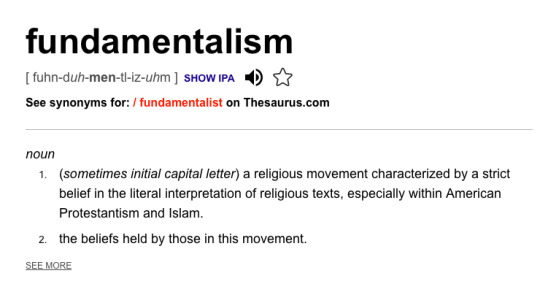#Inerrancy
Quote
Believing the inerrancy of Scripture is absolutely necessary for the one who claims to be a Christian.
Nathan Jolly
69 notes
·
View notes
Text

#Bible#Christianity#apostate#inerrancy#evangelicals#evangelicalism#cicumcision#fishing babes#bikini#atheism#superstition#knife#exodus#Moses#god#ridiculous#scripture
5 notes
·
View notes
Text
Live Stream Sunday School - May 1, 2022
Live Stream Sunday School – May 1, 2022
https://www.facebook.com/gaines.melvin/videos/746959446467048
Sunday school session for Akron Alliance Fellowship Church, Akron OH.
Biblical Inerrancy – Session 13 – Transmission (Part 2)

View On WordPress
#animal skin#bible#biblical inerrancy#copy#Dead Sea Scrolls#Greek#Hebrew#inerrancy#New Testament#Old Testament#papyrus#transmission
2 notes
·
View notes
Text
The Bible

View On WordPress
0 notes
Text
Do we really believe in Sola Scriptura?
I believe in Sola Scriptura. I stand on it theologically in everything. Sola Scriptura literally means Scripture alone, meaning that Scripture alone is our authority.
Why does Sola Scriptura matter to biblical womanhood? Because without the authority of Scripture, there is no case for biblical womanhood. No Titus 2: 3-5. No Proverbs 31 woman.
Without Sola Scriptura, we have nothing.
I stand on Sola Scriptura. I stand on it theologically in everything. Sola Scriptura literally means Scripture alone, meaning that Scripture alone is our authority.
I’m a Titus 2…

View On WordPress
#5Solas#biblical womahood#Feminism#Five Solas#Genesis#heaven#inerrancy#infallibility#Jesus#manhood and womanhood#Reformed#Reformed Baptist#Reformed Congregational church#Reformed tradition#salvation#Scripture#six day creation#Sola Scriptura#TULIP#universal flood#young earth
1 note
·
View note
Text
A Pastoral Reflection on Inerrancy
By: T. J. Gentry, D.Min., Ph.D. | November 5, 2023
(This article was prompted by questions submitted to the Bellator Christi site after my recent interview with Dr. Brian Chilton discussing the importance of inerrancy. Here, I offer a pastoral reflection on inerrancy.)
I am a pastor and an academic, but my academic training in Scripture and other areas is for the sake of my pastoral ministry,…

View On WordPress
0 notes
Text
Religious fundamentalism hangs by a thin thread
It occurs to me this morning that religious fundamentalism hangs by a very thin thread. That’s why it’s guarded so assiduously. The thread is that every word of an ancient and powerful book is, in fact, the very word of God for all time.
Since most people don’t actually read those books they don’t realize that they already have decided certain of those words no longer apply, but they accept the…

View On WordPress
0 notes
Text
A New (Old?) Take on Inerrancy
The Bible is the book God wanted us to have, and He wanted us to have it the way it is.
I did the research and wrote a thesis in college in support of the concept that Scripture is inerrant. I have mentioned this before. I was not a religion major in college only because I did not turn in my thesis.
I didn’t turn it in because I was having a hard time getting to where I wanted to go using Scripture and the scholarly work that was done up to the early 1980’s. I could not support my…

View On WordPress
0 notes
Text
Cessationism from Tom Schreiner
Schreiner argues that 1 Cor 13:10 is an argument for continuationism because its immediate context suggests that prophecy should be expected until the eschaton of Christ’s return (the perfect comes).
Instead, he argues that the issue hinges on what you think an apostle and prophet is (one who speaks forth inerrant Scripture).
Textually, his argument is based on Eph 2:20 and Eph 3:5 and that we should not expect there to be any more apostles in that strict, narrow sense.
0 notes
Text
Rip to the founding fathers. They would've loved Doritos.
#weekly reminder that they were in their 20s and mostly rich and drunk a lot#the way ppl treat the constitution like the bible is weird and kinda gross#look at this inerrant document that def applies to the modern world seamlessly#im js if they got beamed here from the continental congress to 2023 they wouldnt be in dc#theyd be in florida begging women with body hair to do jello shots and saying shit like#look at that wagtail i wanna spend a night in her custom house#and its a simple game john if youve done what they say you sluice your gob#and look at the double jugg on that chap... no molly#and ive never been with a black woman i didnt own#and its just ridiculous that theyre deified#the founding fathers wouldnt stand for this#bruh the founding fathers would immediately eat 7 edibles and die of dehydration on rule 34 dot com shut up#uhhh *24 im not retyping that shit lol
9 notes
·
View notes
Text
Inerrant Voice (Oracle Archetype)

(art by Fetasy on DeviantArt)
Throughout history, many governments have kept religious advisors on their staff, some willingly to have the guidance of the divine on their side, and others more compulsory because the faith in question was a monolithic political figure in it’s own right. Either way, these spiritual advisors would provide advice to the best of their ability, though exactly to what end would vary by the faith and the individual.
Now, take that concept to its logical conclusion in a fantasy setting, and you have advisors that outright can ask questions of the heavens and return answers.
While the cardinal archetype would serve well enough here for clerics, the inerrant voice archetype is what is used for this concept if you’re playing an oracle, which, with it’s charisma primary stat, is already well-suited to a political role.
Additionally, their divine magic also makes them suited for not just advise, but also protection, keeping their liege or others safe from harm.
I have to imagine that cultures that utilize inerrant voices in their courts may believe that these beings, having been touched by the divine directly, may be closer to the gods than even their cleric contemporaries, and therefore more prone to providing accurate advice.
Regardless, we shall soon see an oracle that excels at guiding and protecting others.
The divine forces that grant these oracles their power shape them to fit their role as advisors and protectors, granting them slightly different spells, including one that lets them absorb some of the harm another would receive, as well as a variety of information-granting divinations.
They also grant a new revelation, one that allows them to select a ward each day. At first, this warding allows them to reflexively cast defensive magic on them when they would come to harm. Later on, they can use it to transpose themselves with their ward, taking the harm in their place.
Like most oracle archetypes, this one is very simple, but it does add some nice flavorful abilities for it’s two functions. Being able to instantly cast abjuration spells on an ally a few times per day can be a godsend, and the divination utility is very useful as well. I would recommend a build focused on defensive buffs, but also a nice selection of battlefield control to prevent them and their party (especially their ward) from being overwhelmed.
History and fiction are full of advisors with ulterior motives, be they selfish, or in the name of dark gods. This archetype assumes this is not the case, of course, since it’s doubtful the divine would grant such powers to someone who did not with to use them, but that does not mean it’s impossible. If their faith is a political faction in it’s own right, their guardianship may be conditional on their ward’s adherence to church doctrine, for example. Of course, oracles are also rarely bound to any one god anyway, so how your character interacts with the concept of loyalty may vary a lot.
The oracle Nogara has received a vision most alarming: one of the noble clans plans to betray her emperor, and worse still, they’ve summoned a soul-enslaving kalavakus demon to aid them. The party must be swift to investigate which house is responsible, and of course banish the fiend when it rears it’s ugly head.
They say that the warden of Ironmouth Prison is blessed by the Judicator himself, and has an uncanny knack for seeing any escape attempts coming. Very few prisoners have ever left there before their sentence was up, even with outside help, and yet that is what the party must now do.
The palace is in chaos! A visiting aquatic elf dignitary has been kidnapped, their oracular bodyguard slain. It’s a race against time to track the kidnappers and rescue the dignitary, as the elven nation is placing full responsibility upon the king for this turn of events.
5 notes
·
View notes
Quote
Can God reveal Himself to humanity? And, to be more specific, can He reveal himself in language, the specifics of which become normative for Christian faith and action? With an inerrant Bible these things are possible. Without it, theology inevitably enters a wasteland of human speculation. The church, which needs a sure Word of God, flounders. Without an inerrant revelation, theology is not only adrift, it is meaningless. Having repudiated its right to speak on the basis of Scripture, it forfeits its right to speak on any other issue as well.
James Montgomery Boice
13 notes
·
View notes
Text

Literal depiction of real verse from the actual Bible.
Image: tumblr
#inerrancy#scripture#literal interpretation#old testament#exvangelical#ex religious#ex fundie#fundamentalist
1 note
·
View note
Text
Sunday School Live Stream - May 1, 2022
Sunday School Live Stream – May 1, 2022
https://www.facebook.com/akronalliancefellowship/videos/797274077917630
Sunday school session with Melvin Gaines.
Biblical Inerrancy – Session 13 – Transmission (Part 2)
View On WordPress
#animal skin#bible#biblical inerrancy#copy#Dead Sea Scrolls#Greek#Hebrew#inerrancy#New Testament#Old Testament#papyrus#transmission
2 notes
·
View notes
Text
"John 1:1 is about the Bible actually" isn't a take I think I would ever be ready to hear
#My beloved the Bible is divinely inspired infallible and inerrant but it is NOT God#that verse is about Jesus the logos the Word made flesh#I also think theyre arguing that a Table of Contents at the start of the Bible is part of Scripture#if thats the case I cant wait to show them 2 Bibles that have different books in them and ask which is correct
16 notes
·
View notes
Text
The Bible
When I was very young, I was handed an International Children's Bible and told that this was the inspired, inerrant ("that means without errors, no mistakes"), perfect word of God.
I understood that God himself had dictated the words I now held in my hands.
A few years later I realized that the inspired men who had written God's words had not written them in English. God had not spoken English to them because they didn't speak English: they spoke Hebrew and Greek and Aramaic. So these were not God's words. They were translations of God's words.
Now that I speak more than one language myself, I know exceedingly well that things are always lost in translation. Even the best translation is imperfect, at the very least. So no Bible we have today is perfect.
Some years later I discovered that "inspired to write by" is not the same as "took dictation from."
These were never God's words.
They were the words of men who phrased, in their own ways, in their own words, the things God made them feel and think—or encouraged them to feel and think. This meant human error was a possibility even in the original manuscripts.
I learned later that no one has the original manuscripts. We have copies of copies of copies.
And they don't agree.
They don't match each other. There are so many differences between them. How can we tell which copies match the originals when we don't have the originals?
Even if we could, what does it matter given that the originals themselves might have been flawed?
I told myself that the word of God may have been imperfectly written by the original writers, but in that case maybe God had used copyists "mistakes" to correct those errors—but which ones? Which errors were correction, and which merely error?
Decades later I discovered some books of the Bible that weren't in my Bible. The Catholics had a fuller, more complete Bible!
Catholics are evil child molesters, of course; but they don't get that from their extra books, and even Hitler was right about one plus one equalling two. You can't reject everything a person believes just because they're a bad person. Why didn't my Bible have Tobit and Judith and so on? The Codex Sinaiticus has them, and it's 4th century, much closer to the originals than my ESV.
Why did we Protestants reject parts of the Bible?
Come to that, why did we not have the books of the Bible that the Bible seemed to think we should have?
I read the Bible assiduously, and when John told me "as the scripture has said" and then I didn't find the quote anywhere I became quite upset! Turns out the scripture referenced repeatedly, in Jude and 2 Peter and John, is the book of Enoch.
Why don't we have that in our modern Bibles?
We have old manuscripts of it in Aramaic and Hebrew and Latin and Greek and Coptic and—was God not trying to preserve it? The apostles call it scripture!
On and on the questions and problems went, and all my father could ever say was, "You think too much."
I was troubled by that as a youth.
I tried to stop thinking. To blindly accept: to believe without evidence, in the face of contrary evidence. But I couldn't.
Dad was right.
I think too much to be taken in by a lie.
#the bible#ex christian#unreliable source#far from inerrant#exceedingly imperfect#even leaving everything else aside#the bible is not a reliable source of truth#it's too corrupt to be anywhere near entirely trustworthy.#Merry Christmas!
6 notes
·
View notes